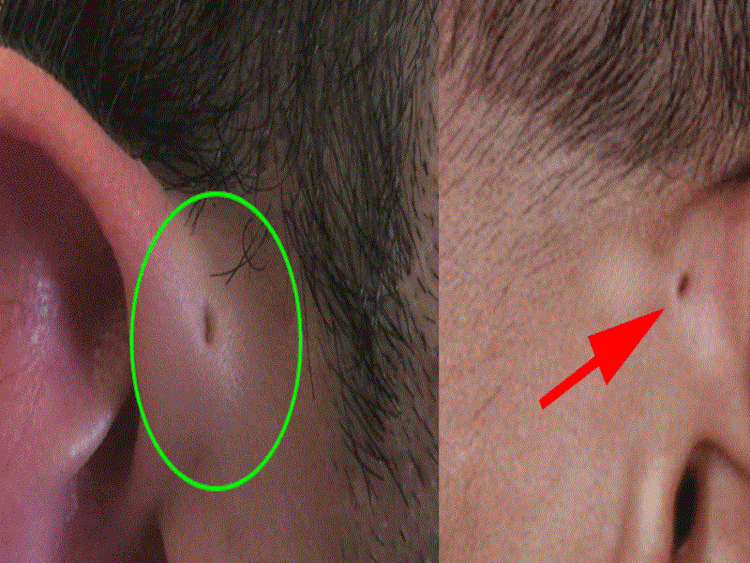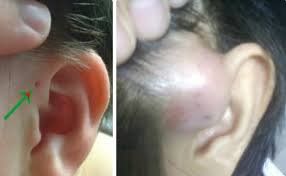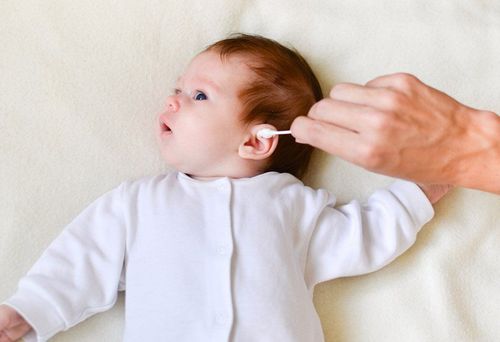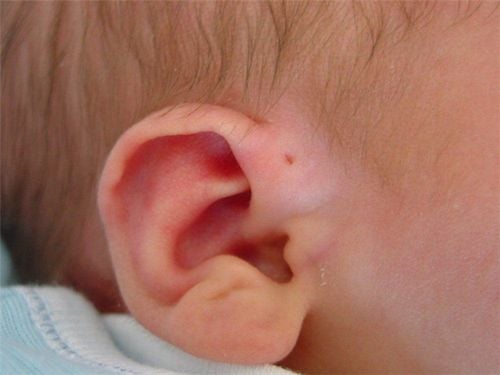This is an automatically translated article.
The article was professionally consulted by Specialist Doctor I Le Van Quang - Ear, Nose Throat Doctor - Department of General Surgery - Vinmec Nha Trang International General Hospital. BSCKI. Le Van Quang is an expert in the field of ENT with 15 years of experience.Atrial fibrillation is a congenital anomaly that occurs in early pregnancy, which may be associated with other congenital malformations. Atrial rotator cuff fistula can cause complications such as inflammation, more serious can form an abscess if not know how to treat and care for the child properly.
1. What is atrial fistula?
Atrial fibrillation is one of the common birth defects that can occur in one or both ears and is usually discovered at birth.Characteristics of rotator cuff fistula: The fistula is as small as a toothpick, appearing in the area in front of the auricle, where the cartilage of the auricle is adjacent to the face, the atrial fistula usually goes deep into the base and attaches to the cartilage. In the lumen of this fistula is a tube paved with epithelium capable of secreting secretions. When exudation is not treated, it can stagnate fluid, causing inflammation, swelling, pain, and fluid leakage...
Causes of atrial fistula formation: Atrial fistula is formed due to an incomplete combination. between the first and second gill arches to create the external ear canal at 6 weeks of gestation. It is often seen that women have a higher risk of this disease than men
This disease is often ignored because many people do not understand the condition of the disease, so often the disease is not cleaned properly, causing many infectious complications hazardous.

Rò luân nhĩ là một trong những dị tật bẩm sinh phổ biến
2. Identification signs
Usually, children with atrial fistula, apart from a small hole visible to the naked eye in front of the lobe of one or both ears, do not show any unusual symptoms unless there is an infection. When the fistula is infected, it will cause abnormal signs for the child such as:Fever, pain, itching in the ear area, making the child fussy, stop feeding, sleep poorly. The fistula mouth may bleed, the fluid is usually white, yellow with a foul odor. The fistula may bulge into a small cyst increasing the risk of an abscess forming from the cyst. Superinfection of the cyst may occur, producing an atrial fistula abscess.
3. How to treat atrial fistula?
When there is no infection in the atrial fistula, there is no need to treat it, just apply the methods of care and follow up to prevent infection for the child.However, when the child has signs of infection, the formation of an abscess in the atrial fistula requires treatment.
Medical treatment
If the infection is mild, the child can be treated with medical therapy, using antibiotics and anti-inflammatory drugs, reducing pain, and properly cleaning the inflamed area. If pressure foci form, it is necessary to conduct antibiotic treatment according to the results of antibiotic, anti-inflammatory, and analgesic. Aspiration and drainage of the abscess or incision to drain the pus if aspiration is not effective. Surgical treatment: In cases of recurrent inflammation, severe inflammation or abscess formation, surgical treatment is recommended to limit the risk of infection and complications.
Before surgery, if the patient is inflamed, or has an abscess, it needs to be treated stably before performing surgery. Surgery with the aim of resection of the entire fistula for holes prone to infection and recurrence. Perform surgery after the infection and inflammation are gone. Fistulas, if located behind the external ear canal, require two incisions for complete drainage. Atrial fistula surgery is relatively simple, patients can recover soon, the hospital stay is short. If an older child cooperates only with anesthesia , if a younger child is cooperative , general anesthesia may be needed . After surgery, the child should pay attention to lie with his head high for about 1 week and avoid getting dirty water into the surgical area of the child, use antibiotics to prevent superinfection as prescribed by the treating doctor.

Trường hợp nếu nhiễm khuẩn nhẹ trẻ có thể điều trị bằng thuốc kháng sinh
4. Measures to prevent infection
Children can live with atrial fistula for the rest of their lives without any treatment, but to do so, care and follow-up is very important, taking care to limit the occurrence of infections. Measures Measures to prevent infection include:Clean the atrial fistula for the child every day with physiological saline. Do not squeeze or squeeze the child's fistula and do not use a cotton swab to insert it deep into the fistula because it can introduce bacteria to cause an infection for the child. When there is mucus secretion outside the fistula, only use cotton soaked in physiological saline, gently clean the outside. Do not self-treat a child at home when the fistula is already inflamed. When there are signs of atrial fistula inflammation such as fever, pain, itching, and foul-smelling fluid coming out of the fistula, the child should be taken to a medical facility for examination and treatment promptly. When a child has an abnormal small hole on the ear lobes on one or both sides, parents should take the child to the doctor to determine an abnormal pathology such as atrial fistula. When detecting the disease, if the child does not have an infection, it is advisable to take proper care measures and monitor the occurrence of abnormal signs in time to avoid causing dangerous complications for the child for a long time.
As a key area of Vinmec Health system, Pediatrics Department always brings satisfaction to customers and is highly appreciated by industry experts with:
Gathering a team of top doctors and nurses in Pediatrics : consists of leading experts with high professional qualifications (professors, associate professors, doctorates, masters), experienced, worked at major hospitals such as Bach Mai, 108.. Doctors All doctors are well-trained, professional, conscientious, knowledgeable about young psychology. In addition to domestic pediatric specialists, the Department of Pediatrics also has the participation of foreign experts (Japan, Singapore, Australia, USA) who are always pioneers in applying the latest and most effective treatment regimens. . Comprehensive services: In the field of Pediatrics, Vinmec provides a series of continuous medical examination and treatment services from Newborn to Pediatric and Vaccine,... according to international standards to help parents take care of their baby's health from birth to childhood. from birth to adulthood Specialized techniques: Vinmec has successfully deployed many specialized techniques to make the treatment of difficult diseases in Pediatrics more effective: neurosurgery - skull surgery, stem cell transplantation. blood in cancer treatment. Professional care: In addition to understanding children's psychology, Vinmec also pays special attention to the children's play space, helping them to have fun and get used to the hospital's environment, cooperate in treatment, improve the efficiency of medical treatment.
Please dial HOTLINE for more information or register for an appointment HERE. Download MyVinmec app to make appointments faster and to manage your bookings easily.











